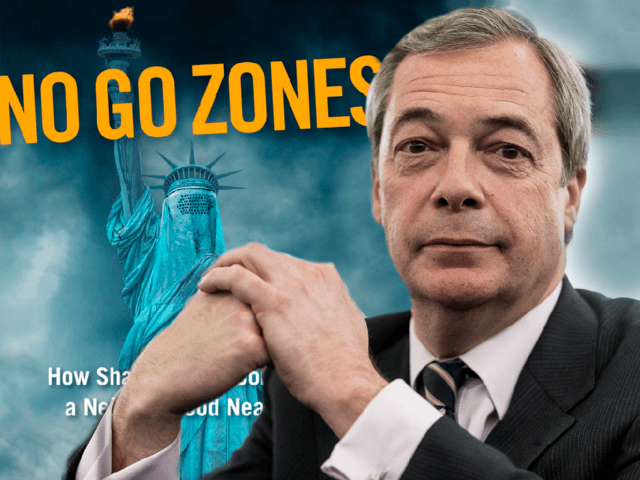The following is an excerpt from the foreword of the new book No Go Zones: How Sharia Law is Coming to a Neighborhood Near You, written by Breitbart London Editor in Chief Raheem Kassam. The book is released today and available now on Amazon.com (and Kindle), Books-a-Million, Barnes & Noble, iTunes, and Audible.
FOREWORD by Nigel Farage MEP:
When Raheem told me he was writing this book on No Go Zones in the Western world, my first reaction was “Thank goodness someone is doing this job.”
My second thought was, “I hope he’s careful.” The reason for my first response is probably self-explanatory. This is an issue that is so contentious mainly because no one has yet documented these areas as comprehensively as Raheem does in this book.
It’s a topic that is marred by half-truths, full denials, slips of tongues, and an attempt to reject the notion of such areas in such a brazen and unfounded manner that much of the establishment media that spends its time in denial can truly wear the title “Fake News” proudly.
Now, I’m pleased to say, they have a very good starting point by which to judge the merits of the debates on integration, assimilation, and the scale and speed of migration into the West.
My second thought on the book was multifaceted.
Firstly, people who speak out against radical Islam, highlighting issues such as Sharia law, terrorism, and indeed things that shouldn’t be contentious like integration are often targeted, abused, endure massive attempts at being discredited, or even find themselves on the receiving end of threats or violence.
As a personal friend, I am sincerely concerned that such brave truth-telling on the subject might find Raheem on the receiving end of some of this.
But as a professional colleague, I was also concerned at the scale of the task. How can you, I wondered, summarize so much, over so many decades, in so many places around the Western world in just one book?
I’m delighted to say after having read this book that Raheem has done an excellent job in balancing hard data and statistics, and using multiple areas from around Europe and the United States in his attempt to fairly portray the issues facing majority Muslim areas in the West.
And it’s not just that, either.
From Molenbeek to Malmö, from Brooklyn to Hamtramck, each of these areas has its own, unique characteristics. Its own players. Its own resistance movements. The personal stories and interviews contained in this book shine a much-needed light on how actors, from residents to local officials, politicians, and pressure groups, all play into the massive discord taking place in areas across Europe and America.
Truly, the final product is one that bears reading, citing, and even corroborating by other journalists, who I implore to follow Raheem’s lead in getting to the bottom of these issues.
Of course, with any book of this length, there is so much more to tell, and I hope Raheem can follow up with more information, more trips, more investigation, and more documentation of what is going on in our towns and cities.
I also want to take the opportunity to commend his fair mindedness on this issue. Raheem has been careful not to portray—as someone more alarmist might—these communities as marauding, out of control groups intent on the decline of the West.
In a lot of instances in fact, the people who find themselves ghettoized and demonized from all sides are victims themselves of their community leaders and actors who want to drive a wedge between migrant communities and native populations. The work concerning poverty and socioeconomic factors is pivotal. The work on Deobandism and the Tablighi Jamaat movement is seminal. And the work contained in this book on the aggravating factors—usually the establishment, the political Left—is a warning sign to America to stand up and assert its identity, enforce its laws, and demand integration before it is too late for many places in the United States.
There will of course be plenty of critics of this book. They’ll ask questions like, “If these places are really ‘No Go’, how come you were able to go there?”
The answer should of course be obvious if you read the text. Raheem timed his visits carefully, didn’t seek to antagonize locals with video cameras, and in some cases—already reported by news organizations across the board—managed to luckily avoid mass incidents of violence and rioting by a matter of hours.
In short: it was due to the studiousness of his approach that he managed to fairly document his experiences and put together a piece of work that will stand the test of time both academically and from a philosophical perspective.
It should be required reading for conservatives, Republicans, liberals, teachers, students, reporters, editors, and activists alike. And I’m delighted he has managed to resist tabloid-style presentation, and painstakingly sought out reliable sources, high-level interviews, and even hard-to-come-by data on topics like crime, imprisonment, and more.
If you do one thing after picking up this book, I recommend this: buy it for, or recommend it to, someone else too, and do your part to help settle the debate we shouldn’t even be having— whether or not these areas exist.
Only by leaping this hurdle can we get onto the real debate: what should we do about it, now that it is on our shores?
Buy your copy of No Go Zones now.
Nigel Farage MEP is the former leader of the UK Independence Party, is a host on LBC, and a Fox News contributor

COMMENTS
Please let us know if you're having issues with commenting.